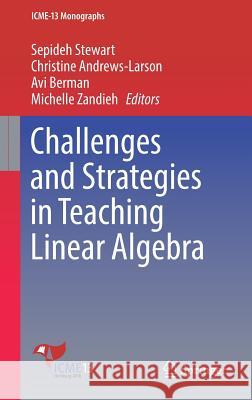Challenges and Strategies in Teaching Linear Algebra » książka
Challenges and Strategies in Teaching Linear Algebra
ISBN-13: 9783319668109 / Angielski / Twarda / 2018 / 382 str.
This volume presents research on students' conceptual difficulties with linear algebra. It discusses the following research questions: a. How can applications of Linear Algebra be used as motivation for studying the topic? b. What are the advantages of proving results in Linear Algebra in different ways? c. In what ways can a linear algebra course be adapted to meet the needs of students from other disciplines, such as engineering, physics, and computer science? d. How can challenging problems be used in teaching Linear Algebra? e. In what way should technology be used in teaching Linear Algebra? f. What is the role of visualization in learning Linear Algebra? g. In what order (picture, symbols, definitions and theorems) should we teach Linear Algebra concepts? h. How can we educate the students to appreciate the importance of deep understanding of the Linear Algebra concepts? The above research questions are used as a starting point, however the volume also covers a wider spectrum of issues in teaching and learning of Linear Algebra. It therefore includes a section with research based papers followed by a section with practical ideas on teaching Linear Algebra tasks.











